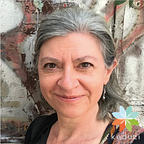In the climate change field, people often talk about “giving up hope” or “feeling hopeless”– or even “feeling hopeful.” What are we talking about? What, exactly, are we hoping for?
Do those of us in the climate change field (or: sector, industry, movement) — do we have an implicit agreement about what we mean? Is the hope that we can continue our lifestyles the way they are? That a “green” solution will be found? Or perhaps people are giving up hope that such a solution will be found.
Let’s unpack this a bit. What does wanting to keep our lifestyles imply?
- Our lifestyles now are good, and/or
- We can’t imagine our lifestyles being any better than they are now; things can only get worse.
Now imagine you are someone who has not benefited from the dominant world economic system, and everyday life is a struggle. Would you hope you could keep your lifestyle the way it is?
And what might it look like from your new point of view to see people desperate to hold onto their more privileged lifestyle — perhaps at any cost? People not concerned with how their lifestyle has meant that you have had to have much less?
This train of thought can lead those of us in the Western world — with middle-class lifestyles, mainly white people — to feel a lot of guilt and shame. These privileged lifestyles are made possible because of the patterns of our white supremacy culture. We are meant to feel separate and disconnected from one another. Not just from people halfway around the world, but from people suffering in our own towns and cities, from our own neighbours, and, even our own family members.
We are left feeling that there is only so much of this kind of lifestyle to go around. And I really want it for me and my family. And I’ve been trained really well in this culture. The despair and the pain is real. I don’t want to lose this privileged lifestyle.
There are people who, over the past several hundred years, have experienced this kind of collapse. Their entire way of life was taken away and replaced with something that wasn’t as good.
Now, in their case, their lifestyle may have been more connected to nature and more
community driven, and, we might say, healthier. But it’s hard for us to see that with our privilege.
This feeling of discomfort, as we awaken to these perspectives, is just where we need to be. We need to be really comfortable with feeling uncomfortable about this and talking about it with one another. We need to learn from, by listening to, other people: people of colour, Black and indigenous people, people with disabilities, people in prison, working class people — people who have a different perspective on the system than we have. People who know that the system doesn’t serve everyone. People who do not feel attached to the system continuing the way it is, because: why would they? Why would they want that system to continue? They want something different; they want something better. And the better would be better for everybody. But it’s hard for people with a lot of privilege to see that.
So when we talk about hope, what are we hoping for? Are we hoping for a continuation of our privileged lifestyle? Or might we be talking about hope that we can overcome the white supremacy training and culture to make something new, and to practice that new culture where we live, where we work?
What do we need to work on in order to get close to the people who are most marginalised by society, so that we can find out how they use human connection? How they got through and get through collapse and disruption — and a system that has never worked for them.
What do we need to work on to be able to make friends with people who understand this better than we do, to learn from them, to go into communities of mutual aid with them, and to use our power and privilege to support resistance against the system that killed them, and continues to kill them — the system that we have been trying to prop up.
If we can redirect that power and privilege towards supporting the leadership of people who are in resistance, then that’s where the love will be, that’s where we will find a calming of our anxiety, and we will no longer be in despair.
That’s the hope. The hope that we can get to that place where we can feel connected with other humans, especially humans that are not in our current circles. A hope that we can stop being numb to the suffering that’s going on in the world. That’s the hope.
We have full hope that we’re going to love each other, that we’re going to take care of each other. That we are going to figure out how to help each other, no matter what happens in the future.
That, to me, is the hope. What do you think?
Join me for conversations such as these. List of workshops. Twitter. LinkedIn. Facebook. YouTube. Sign up to receive upcoming dates and other offerings.
